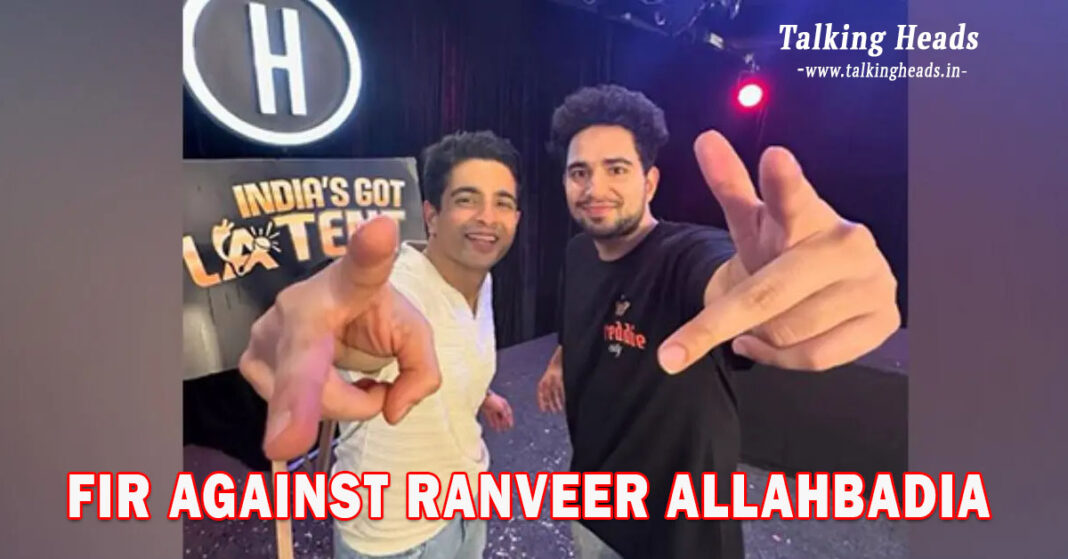Mumbai Police Files FIR Against Ranveer Allahbadia and Others Over Controversial Comments
The recent controversy surrounding YouTuber Ranveer Allahbadia has sparked widespread debate on the ethical boundaries of content creation. Mumbai Police have registered an FIR against Allahbadia, comedian Samay Raina, content creator Apoorva Makhija, and the organizers of the show India’s Got Latent over allegedly offensive remarks made during the show. The complaint, filed by advocates Ashish Rai and Pankaj Mishra, accuses them of making indecent comments about women and parents, leading to public outrage.
Table of Contents

Political Leaders Condemn the Incident
The controversy has attracted the attention of political leaders, with Maharashtra Chief Minister and opposition figures condemning the remarks and demanding stringent action. In response to the backlash, Allahbadia has issued an unconditional apology. However, the incident raises larger questions about the responsibility of digital content creators and the limits of free speech in India.
Should There Be a Limit to Adult Content?
This incident has reignited the debate on what should be permissible in the name of entertainment. While freedom of speech is a fundamental right under Article 19(1)(A) of the Indian Constitution, it is subject to reasonable restrictions under Article 19(2). These restrictions prevent speech that threatens national security, public order, morality, or an individual’s reputation.
Given the growing influence of digital media, should platforms like YouTube have stricter regulations on adult content? Should creators be more mindful of the cultural and ethical implications of their statements? These are questions society must grapple with as digital content consumption skyrockets.

The Role of Content Creators in Shaping Society
Entertainment and humour have always played an essential role in shaping societal perspectives. From classic films like Padosan, Golmaal, and Chupke Chupke to modern comedies, humor has evolved. However, the current trend of using controversial and explicit jokes for virality raises concerns about its impact on social values.
Historically, youth have been at the forefront of transformative movements. Figures like Swami Vivekananda and Udham Singh dedicated their lives to shaping a better society. The question remains—should modern youth influencers prioritize responsible content creation over sensationalism for views?
Legal and Social Implications of the Controversy
The FIR filed against Allahbadia and his peers highlights the legal consequences of content that is deemed offensive. The complaint, also backed by Congress’s NSUI representative Nikhil Ruparel, accuses them of promoting obscenity and inappropriate language. As legal proceedings unfold, the case could set a precedent for how digital content is regulated in India.
Moreover, this incident underscores the need for greater awareness about the ethical responsibilities of content creators. While entertainment should be creative and engaging, it should not cross the boundaries of decency and respect.

Government and Platform Responsibilities
With the digital landscape expanding rapidly, should the government or platforms like YouTube impose stricter regulations? While society reacts to content in various ways, the responsibility of monitoring and curbing inappropriate material should not solely fall on viewers. Article 19 of the Constitution already outlines the limits of free speech, but enforcement remains a challenge.
Stricter content moderation policies, clear guidelines for creators, and audience awareness campaigns can help maintain a balance between creative freedom and ethical responsibility. The government, social media platforms, and content creators must work together to ensure that digital spaces remain respectful and responsible.
Conclusion: The Need for a Balanced Approach
The Ranveer Allahbadia controversy serves as a reminder that while free speech is a fundamental right, it comes with responsibilities. The debate over what constitutes acceptable content is not new, but with the rise of digital media, it has become more relevant than ever.
Striking a balance between creative expression and ethical content creation is crucial. Content creators must be mindful of their influence, and regulatory bodies must ensure that harmful content does not go unchecked. As digital consumption grows, so does the need for a more responsible and thoughtful approach to online content creation.










